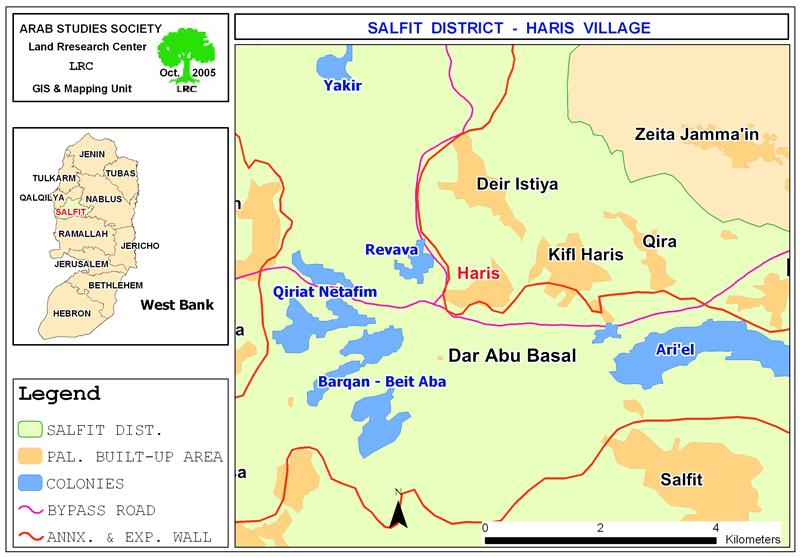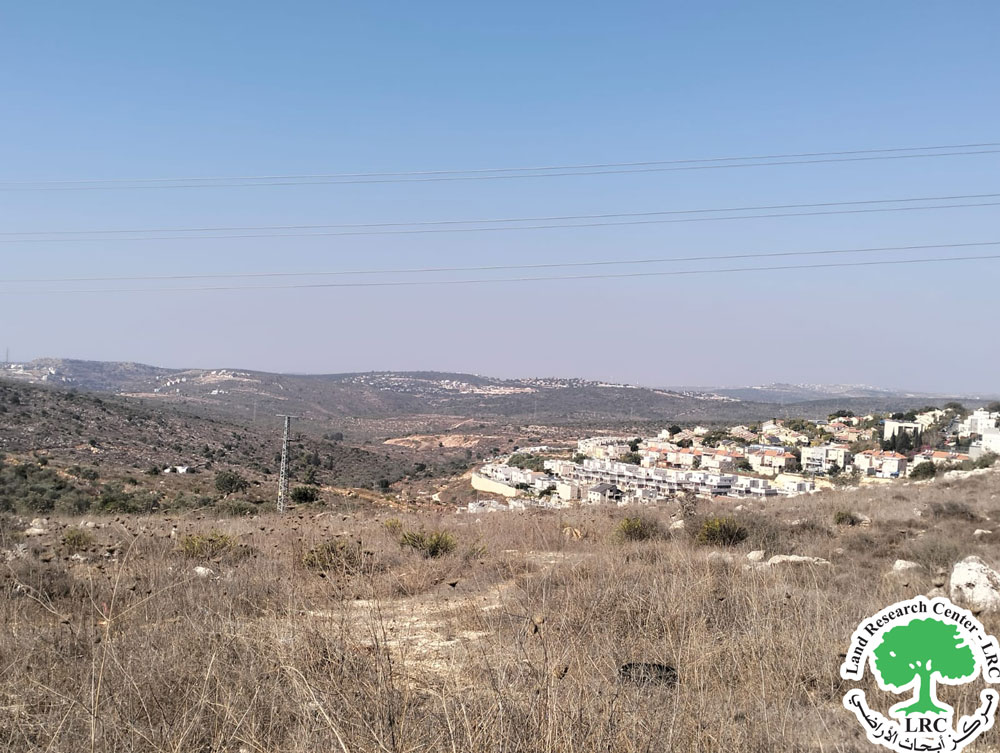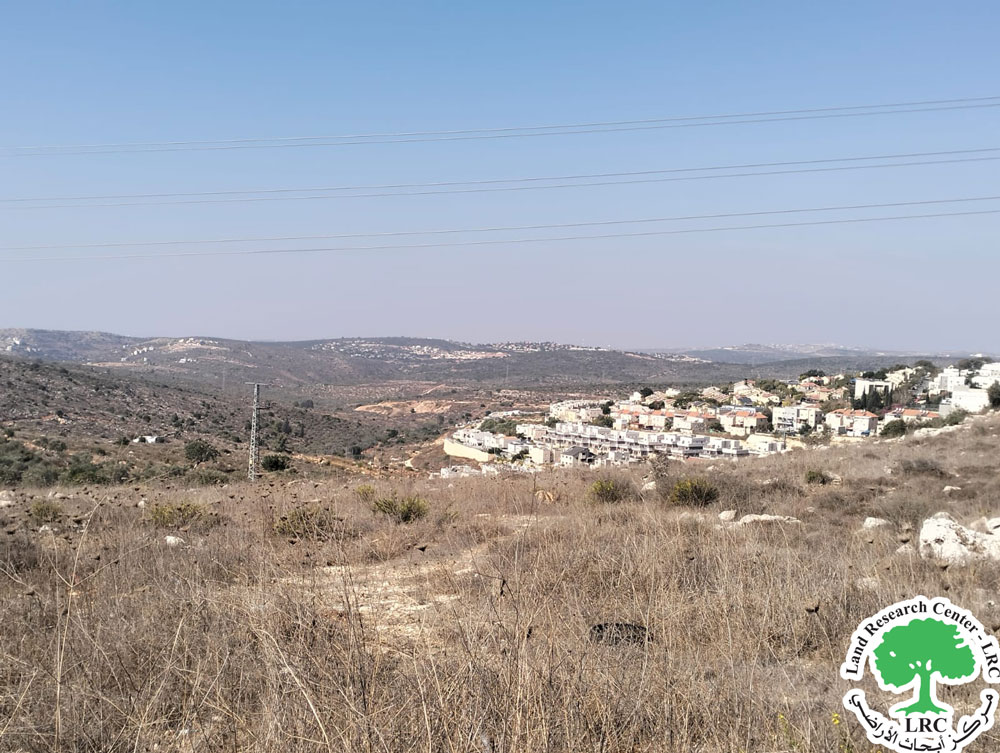To Construct a Colonial Agricultural Road, the Occupation Uproots 62 Olive Trees in Haris Village/ Salfit Governorate
Violation: Clearing olive-planted land for the construction of a colonial road.
Location: Haris village, located northwest of Salfit Governorate.
Date of Violation: November 3, 2024.
Perpetrators: Israeli occupation forces.
Affected Party: Farmer Baha’ Abdullah Mahmoud Qassem.
Description:
On the afternoon of Sunday, November 3, 2024, a new assault by the occupation forces targeted olive trees in the "Al-Tayarat" area, located south of Haris village in the Salfit Governorate. This incident coincides with the current olive harvest season.
Farmer Baha Abdullah Mahmoud Qasim, a resident of Haris village and the sole provider for a family of five (including two females and three minors), was shocked on Sunday while heading to his land in the "Al-Tayarat" area, accompanied by other farmers. They had obtained prior coordination to harvest olives. Upon arrival, they found that the Israeli occupation forces, in coordination with settlers, had bulldozed an agricultural road connecting to the "Revava" settlement. The road, 200 meters in length, was covered with gravel material.
This road cuts through his seven-dunam plot of land, resulting in the uprooting of 62 olive trees, each 30 years old, and the destruction of 200 meters of stone walls that bordered the plot.
According to the testimony of the affected farmer to the Land Research Center's researcher:
"My land is located 200 meters from the 'Revava' settlement. For the past four years, I have faced significant challenges in accessing my land due to settlers opening roads near it and seizing adjacent pathways. Last year, settlers cut down olive trees on my land, and prior to that, in 2005, they also cut down a large number of trees there.
Today, I was shocked to find the occupation forces had opened and paved a road passing through the middle of my land. When I went to the site, the Israeli army arrived, expelled me from my land, and informed me that the road was a security road serving the settlement's security. The army did not allow me to stay on my land or even harvest the olives, leaving me stunned by what they had done."
Additionally, according to farmer Qasim, he stated:
"The area where the road was bulldozed resulted in the uprooting of 62 olive trees and the destruction of the stone walls that were protecting the land. I did not receive any prior notification about the land being seized or even declared as state land."
It is worth noting that the "Al-Tayarat" area has witnessed numerous documented violations. According to the field researcher, the occupation forces previously cut down and damaged no less than 200 olive trees under the pretext that parts of the land were classified as state land. In March 2024, settlers from the "Revava" settlement burned olive trees in the area. Additionally, in July 2024, four dunams of olive-planted land were bulldozed to open a road serving the "Revava" settlement farm.
Attacks on Trees: A Form of Israeli Violations Against the Palestinian Environment
The frequency of attacks by settlers and the Israeli army on Palestinian trees has been escalating. According to the field research team at the Land Research Center, the occupation forces targeted more than 57,323 trees and saplings from the beginning of 2024 until October 31, 2024—marking the highest number in the past decade. Of these, 90% were completely destroyed, signaling a dire environmental catastrophe.
The loss of trees—whether through cutting, burning, or poisoning—results in a reduction in the number of trees, which in turn shrinks the vegetative cover. This vegetation plays a vital role in supplying the region with significant amounts of oxygen while removing carbon dioxide. Furthermore, the loss of trees leaves animals unable to find shelter and food, posing a threat of extinction to some species due to the destruction of their natural habitats. This negatively impacts biodiversity, exacerbating the environmental harm.
Haris Village:
Haris village is located to the northwest of Salfit city, approximately 6 kilometers away. The total area of the village is 8,450 dunams, with the built-up area of the village itself covering around 320 dunams. It is bordered to the north by Deir Istiya, to the east by Kifl Haris, to the southwest by Bruqin and Kafr al-Dik, and to the west by Qarawat Bani Hassan.
The population of the village is around 4,137 people, according to the Palestinian Central Bureau of Statistics in 2017. The families residing in the village include: Abu Ata, Dawood, Salama, Sultan, Shhadeh, Soof, Awad, Faza, Qasim, and Klib.
Haris village stands as a living witness to the harshness and brutality of the Israeli occupation, as the colonial "Route 505" was established on its fertile agricultural lands. This road stretches for 4 kilometers and connects the Green Line to the heart of the occupied West Bank.
[1] Source: LRC.
مشروع: حماية الحقوق البيئية الفلسطينية في مناطق "ج" SPERAC V - FCDO
Disclaimer: The views and opinions expressed in this report are those of Land Research Center and do not necessarily reflect the views or positions of the project donor; the Norwegian Refugee Council.
إخلاء المسؤولية: الآراء ووجهات النظر الواردة في هذا التقرير هي آراء ووجهات نظر مركز أبحاث الأراضي ولا تعكس بالضرورة وجهات نظر أو مواقف الجهة المانحة للمشروع؛ المجلس النرويجي. للاجئين



